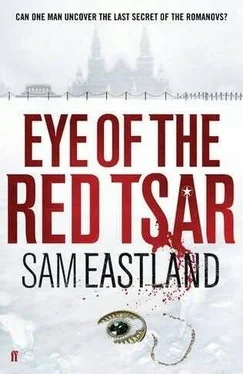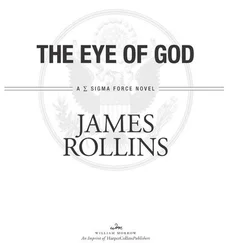“I give you my word,” Pekkala answered.
They walked out into the sun.
“Do you believe in miracles, Inspector Pekkala?”
“It is not in my nature.”
“Then maybe it is time you started.”
Propped against the convent wall was an old bicycle, its leather seat cracked and the black paint covered by a film of dust. The wooden handles showed a burnish of hard use, and the treads on the tires had been worn down almost smooth. In spite of its age, the old machine possessed a certain dignity, as those things do which have accompanied a person on the journey of their lives.
Pekkala looked beyond the iron gates at the long walk down into Sverdlovsk. A fierce blue sky beat down upon the road. The dappling shadows of the poplar trees seemed to offer no comfort at all.
He stared at the bicycle, imagining the cool breeze he would feel upon his face as he freewheeled down the hill, instead of drearily trudging through the heat.
Sister Ania followed his gaze. “Take it,” she told him. “Otherwise, those men will carry it away. By the time it is released from storage that bicycle will be an antique, if it isn’t one already. If it will do you any good at all, please take it now and do not say another word about it.”
Pekkala straddled the bicycle, the old leather seat not as comfortable as he would have liked.
“Well,” said Sister Ania, smiling slightly, “let’s see how you handle it. I don’t want to be responsible for you breaking your neck.”
He rode around in a circle on the gravel path. It had been years since he’d last ridden a bicycle and the front wheel wobbled as he struggled to stay upright.
“Perhaps I have made a mistake,” she said.
“Not at all,” he reassured her as he came to an uncertain halt beside her.
She reached out to him.
Pekkala took her small pink hand in his.
Her touch shocked Pekkala like a jolt of electricity. It had been years since he’d last held the hand of a woman.
“We need you,” she told him. “Don’t ever leave us again.”
Pekkala opened his mouth, but no sound came out. He was too overwhelmed to speak.
Sister Ania squeezed his hand, then let go. Turning, she walked back into the convent.
Far below, at the base of the hill, the road forked left and right. The right fork led into town. The left fork passed along the side of a weed-choked pond and on into a pale green sea of barley fields.
As soon as Pekkala cleared the gates, the road sloped sharply downwards. From then on, gravity propelled him and there was no need for him to pedal. His eyes began to water. The wind in his ears, like the roaring of a gas flame, was all that he could hear. Suddenly, catching himself completely by surprise, Pekkala laughed.
When the bicycle was going so fast that he felt the back wheel begin to shudder, he reached out with his fingers, closed them around the bare metal of the brake levers, and gave them a light squeeze. But the bike did not slow down. Pekkala glanced down in time to see the old rubber brake pads coming apart in chunks as they connected with the wheel rim.
With no idea why, Pekkala was still laughing. He could not help himself.
He gave the brakes a tighter squeeze and the bicycle slowed momentarily. Then both pads flew off completely. He looked behind at the rear brakes and only then did he notice that the cable was missing, rendering them useless.
He roared with laughter and the wind poured into his mouth.
The wheels were buzzing now.
Pekkala struggled to stay on the bike as the trees went by in a blur, a swishing sound as each one passed.
By the time he reached the bottom of the hill, he was holding on for his life. He banked left, gripping the wood handles as tightly as he could. The road leveled out. He straightened the handlebars. Everything seemed to be working. Pekkala had just allowed himself a moment of silent self-congratulation when he heard a loud crack from somewhere behind him. The rear tire had exploded. Out of control, he veered to the left and blew through the tall grass which grew at the side of the road. For a brief moment, he had the sensation of flying, as if the free-spinning wheels might carry him up into the sky. A second later, garlanded with buttercups, daisies, and purple-flowered tangles of vetch, Pekkala pitched forward over the handlebars and into the pond.
For a second, he lay there, facedown. The trees he had passed on his way down the hill still flickered behind his closed eyes.
Then, planting his feet in the mud, Pekkala stood. Pond weeds clung to his coat like green confetti. A bloom of stirred-up silt spread out around him.
As he made his way back to dry ground, pulling at the bicycle and exhausted by the weight of water in his clothes, an image of his childhood returned-of himself and Anton, dragging sleds behind them and struggling under the burden of their winter clothes. They used to sled down a steep hill near their house. The hill was used only in summer, when woodsmen dragged timber out of the forest, rolling the logs downhill to a river where they could be floated to the sawmill in town. In winter, he and Anton had the hill all to themselves. It was back before things changed between them-before the crematory oven, before Anton left to join the Finnish Regiment. Since then, the gap had only widened. Pekkala wondered, as the breath grew hot in his lungs, if they could ever return to the way things were before. Not without a miracle, he told himself. Maybe Sister Ania is right. Maybe it is time to start believing.
“IS IT RAINING?” OFFICER KROPOTKIN WAS STILL SEATED AT HIS DESK, as if he had not moved since they’d last spoken. He turned around in his chair and looked out through his window at the blue sky.
“No,” replied Pekkala. “It is not raining.”
Kropotkin turned back to Pekkala. “Then why are you dripping on my floor?”
“I have been in the duck pond.”
“Leaving no stone unturned, are you?”
Instinctively, Pekkala brought out his notebook. He opened it. A trickle of water poured out onto the floor. “I have a few questions,” he said.
As Pekkala gave the details of his conversation with Sister Ania, Kropotkin’s face became redder and redder until finally he leaped up from his chair and shouted, “Enough! If all the brides of Christ are as talkative as Sister Ania, then I hope for His sake that Jesus has gone deaf in His old age! What kind of trouble has she gotten me into?”
“None.”
“And what is it you want to know from me?”
“Why did the Tsar inform you that he no longer wanted to escape?”
“That isn’t what he said. He simply ordered me not to attempt a rescue.”
“Why did you think he did that?”
“He may have heard about what happened to his brother, the Grand Duke Mikhail, who was being held under guard in another part of the country.”
“He was shot while trying to escape, wasn’t he?”
“Not exactly.” Kropotkin shook his head. “Apparently Mikhail had been communicating with a group who claimed they were still loyal to the Tsar. Mikhail followed their instructions and, only a few weeks before the Tsar was executed, he gave his guards the slip. What he didn’t realize was that the men who had promised to save him were actually members of the Cheka. They had set him up. As soon as he escaped, they gunned him down.” Kropotkin shrugged. “After that, maybe the Tsar no longer trusted us, and who can blame him? But I would gladly have given up my life to rescue him. If it had worked, who knows? This country might be a different place today.”
“I have spoken to a number of people who believe that more than one of the Tsar’s children survived.”
“What you are hearing,” said Kropotkin, “is the collective guilt of this town. Even if it were possible to believe that the Tsar and the Tsarina were guilty of the crimes held against them by the politicians in Moscow, no one in their right mind could be persuaded that those children deserved to die. At worst, they might have been spoiled. They might have been sheltered from the world. But that was not their doing, and it does not amount to a crime. There are those who despised the Tsar long before he arrived in Sverdlovsk, but people will always despise someone who has more than they do, and it is easier to hate something at a distance. But when the Tsar arrived with his family, they were forced to see him as another human being. To kill a family who stand unarmed before you requires something more than hate. It is why, in the stories they have told you, the children were allowed to go free.”
Читать дальше










